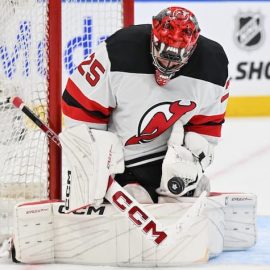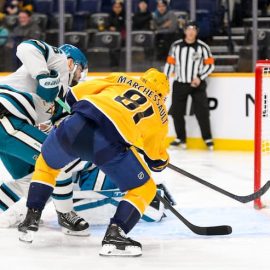The National Hockey League has one of the most unique overtime rules in all of professional sports. Unlike the regular season, which has a three-on-three format for five minutes, followed by a shootout, the NHL’s playoff format for overtime is simple. First team that scores five-on-five, wins. It is literally sudden death. If no team scores after 20 minutes, they have an intermission, and then they go again.
There are no special overtime rules compared to regulation play in the postseason. Quite frankly, it would drive traditionalists like myself bonkers, if they ever decided to change the format.
Longest Overtime Game
The longest overtime game in National Hockey League history came on March 24, 1936 in game one of the Stanley Cup semifinals. The Detroit Red Wings defeated the Montreal Maroons 1-0 at the nostalgic Montreal Forum. The only goal in the entire game was scored by Mud Bruneteau of St. Boniface, Manitoba at 16:30 of the sixth overtime! Meanwhile, Normie Smith of Toronto, Ontario picked up the shutout for Detroit. We don’t know how many saves were made by Smith because shots on goal did not count at the time.
Hec Kilrea of Blackburn, Ontario notched the lone assist on the Bruneteau winner. If the last name Kilrea sounds familiar, it should. That is because Hec’s nephew Brian Kilrea is one of the most successful Canadian junior coaches in hockey history. Brian Kilrea, who is in the Hockey Hall of Fame in the builder’s category, has 1193 coaching wins in the Canadian Hockey League–more than any other coach ever. Kilrea coached the Ottawa 67’s of the Ontario Hockey League from 1974 to 1984, and again from 1986 to 2009.
NHL Playoff Format
In the National Hockey League, the top three teams in each division are guaranteed a playoff spot. The second place team will play the third place team in each division in the first round. In each conference, the two next best teams also advance. If the fifth place team from one division has a better record than the fourth place team in the other division in the same conference, then the fourth place team is out of luck. The best team in each conference will play the lowest seed (regardless if they play in the same division). Meanwhile the second best division winner will play the highest ranked team in each conference that failed to place in the top three in its division.
In the second round divisional rivalries continue. The winners of the conference semi-finals, play for the conference finals, with the winners playing for the Stanley Cup.
Each series is a best of seven, with the first team that wins four games, wins the series. The team with the best record has home ice advantage, and host games one, two, and if necessary, five and seven.
Add The Sports Daily to your Google News Feed!







